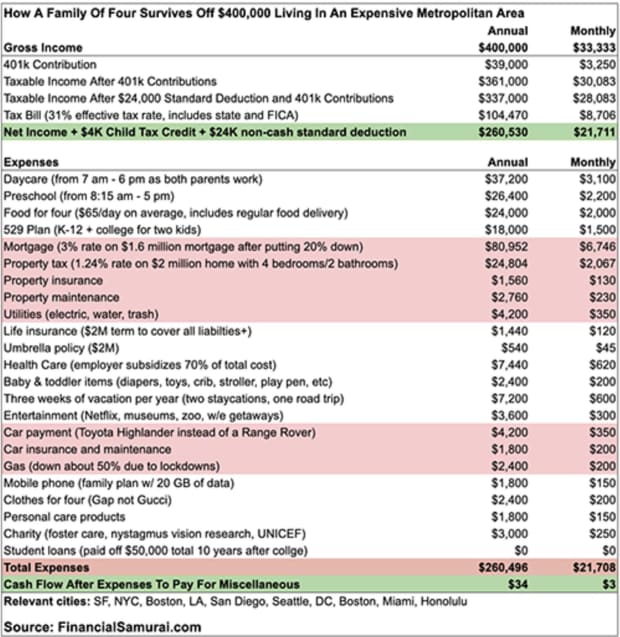This post was originally published on this site

Joe Biden
Agence France-Presse/Getty Images
Apparently, for some earning $400,000 a year, the struggle is real.
Joe Biden defines that threshold as “wealthy,” and, according to CNBC, those making that much money represent the top 1.8% of taxpayers, but the reality on the ground in pricy big cities tells a different story. In fact, at least one financial number-cruncher says that kind of salary barely covers the bills in New York, San Francisco, Los Angeles, etc.
Read: How rich is the ‘middle class’?
“Based on the expenses, a $400,000 household income provides for a relatively middle-class lifestyle,” popular “Financial Samurai” blogger was quoted as saying on CNBC. “A middle-class lifestyle is defined as: owning a home, having two kids, saving for retirement, saving for college, going on modest vacations several weeks a year, and retiring in one’s early 60s.”
Here’s how he breaks it down:

So $400,000 a year leaves you with $34?
Of course, that includes maxing out your 401(k), owning a nice home, taking a vacation, etc. Not a lot of tears are being shed by those who earn much less and can’t make ends meet, but still, it’s easy to see why someone with that kind of salary doesn’t exactly feel wealthy.
“They are not living it up on $400,000 a year,” the Financial Samurai said.
Here’s more on the story, courtesy of CNBC:
As for Biden’s tax plan, he wants the 12.4% Social Security tax to kick back in for incomes above $400,000 and is also looking to put the top bracket rate back to the Obama-era’s 39.6% rate from its current 37% rate. People with adjusted gross incomes at or below $400,000 would have a 0.9% average decrease in after-tax income, while people making that threshold would see a 17.7% after-tax income drop, according to a budget model from the Wharton School of Business.



